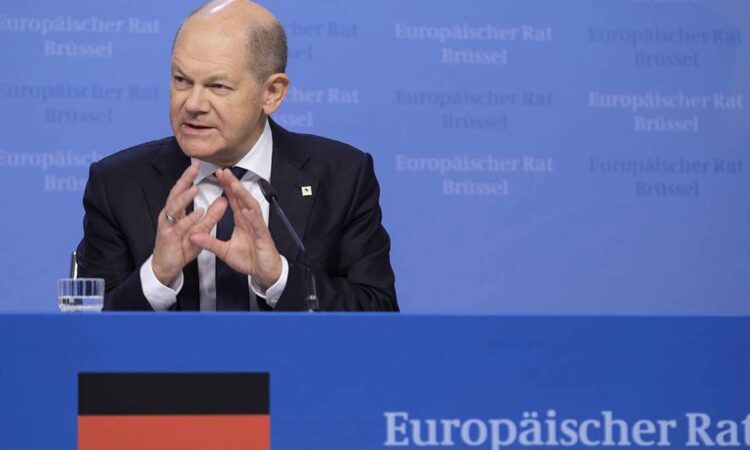
EU member states’ widely divergent responses to surging gas and electricity prices are inappropriate for addressing what is obviously a common European challenge. With winter fast approaching, the absence of common guidelines for national energy policies should be regarded as an economic emergency.
PARIS – Eight months after the Russian invasion of Ukraine, the European Union remains woefully divided on its energy-policy response. At their latest summit, on October 20-21, the leaders of EU member states spent hours arguing with each other. In the end, they issued an official communiqué merely acknowledging that “in the face of Russia’s weaponization of energy, the European Union will remain united to protect its citizens and businesses and take the necessary measures as a matter of urgency.” But the only significant decision they had reached was to step up joint gas purchases – and even that came with crippling caveats.
Policy divergences in Europe are not uncommon. But when COVID-19 hit, it took only around three months for France and Germany to devise a joint rescue-and-recovery proposal, and another two months for member states to agree on the corresponding common EU borrowing scheme. And when the vaccines arrived, there was hardly any argument over whether to purchase them jointly and distribute them equally, in proportion to population.
In the current crisis, divergences are not just about public statements and possible responses. The data show massive economic differences among EU member states. In September, year-on-year inflation ranged from 6.2% in France to 24.1% in Estonia. Notwithstanding variation in national energy mixes and in the share of energy in total consumption, these differences primarily reflect divergent national policy reactions.
With its recent announcement of a €200 billion ($198 billion) package to support households and domestic companies, Germany has shocked its partners. Many see the move as a big step toward a subsidy race that only the Germans can win. These observers are not wrong. The policy sends the wrong signal at the wrong moment, because it points to the lack of a common strategy.
Germany is not alone, of course. According to my Bruegel colleague Simone Tagliapietra, EU governments earmarked an astonishing €576 billion to shield households and businesses from high energy prices just in the past year. Subsidy levels, however, range from less than 1% of GDP in Sweden and Estonia to more than 5% in Greece and Germany. As in the 1970s, European governments’ policy responses are diverging widely, reflecting different fiscal space, different philosophies, and different political-economy constraints.
Fiscal schemes are also very dissimilar. While most feature some combination of across-the-board reductions in energy or value-added taxes and targeted transfers, the proportions range widely. And while most member states have adopted price controls, only some have introduced dual-pricing systems, whereby a certain quantity of energy is available at the subsidized price, with the market price kicking in for all other consumption. The result is incoherence. According to the International Monetary Fund, the pass-through of wholesale to retail gas prices, as of late spring, varied from less than 10% to more than 40%.
The Energy Revolution

Join us for our next virtual event, The Energy Revolution, live from COP27 in Sharm El-Sheikh, Egypt, to hear from Sustainable Energy for All CEO Damilola Ogunbiyi, Egyptian Minister of Environment Yasmine Fouad, US Secretary of Energy Jennifer Granholm, and more.
Together, France and Germany epitomize this failure to agree on a common scheme. In September, France announced a policy to limit the increase in gas and electricity prices for households and small businesses at 15% in 2023, and days ago the government announced a relatively less protective, but still significant package for corporations. By contrast, Germany’s gas commission has just proposed that, beginning in March 2023 onwards, access to subsidized energy be limited to 80% of households’ past consumption (a similar scheme would apply to companies).
France and Germany are also at odds over the design of price caps for wholesale gas prices. Whereas France supports the “Iberian scheme” – with the government setting a ceiling on the price of gas used in electricity generation – Germany opposes it, both because it would make gas more expensive for industrial users and because it would create winners and losers among member states.
These disparate responses warrant criticism not as a matter of principle, but because they are blatantly inappropriate in the face of a common shock. In the space of just a few months, the EU has lost access to a supplier that previously accounted for about 45% of its total gas imports. Given that there is a somewhat unified European market for gas, but not a global one, finding substitutes for Russian gas is a common European challenge. When acting individually, failure to cut demand sufficiently contributes to elevated gas prices for all, and a limited set of alternative external suppliers is available to individual countries.
In general, demand-side and financial interdependencies within the EU or the eurozone dwarf supply-side interdependencies. Though structural policies such as reforms of labor and product markets do have cross-border effects, these tend to be relatively small and slow-moving. But this time is different: the prices of gas and electricity have become overwhelmingly dominant channels through which decisions by one member state affect others, and these effects are amplified by the European Central Bank’s own response to rising inflationary pressures.
The failure to define common guidelines for national energy policies is thus extremely costly. As Tagliapietra and others show in a recent analysis, the gains from achieving a coordinated reduction in demand would be significant. By contrast, “energy nationalism” risks increasing gas and electricity prices even more, aggravating the recession.
Compromise is not out of reach. At the October summit, the European Council did make some progress toward a scheme that would blend price-based and regulation-based options. Germany could still recognize that excessive price volatility is harmful, and France could acknowledge that incentives to reduce consumption do matter.
But mistrust is pervasive, and as time passes and the economic situation worsens, the window for an agreement is closing. Although storage facilities are full and warm weather has driven gas prices down, the problem has not gone away. The risk that the Russian gas embargo will cause deep and increasingly entrenched divisions within the EU remains very serious. Failure to act jointly would send a disastrous signal.






